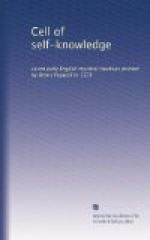And this working shalt thou feel[186] verily folden in thine heart, but if it so be (the which God forbid) that thou flatter and fage[187] thy false fleshly blind heart with leasings[188] and feigned behightings, that thou shalt longer live.[189] For though it may be sooth in thee in deed that thou shalt live longer, yet it is ever in thee a false leasing for to think it before, and for to behight[190] it to thine heart. For why, the soothfastness of this thing is only in God, and in thee is but a blind abiding of His will, without certainty of one moment, the which is as little or less than a twinkling of an eye. And, therefore, if thou wilt pray wisely as the prophet biddeth when he saith in the psalm: Psallite sapienter;191 look that thou get thee in the beginning this very working of dread. For, as the same prophet saith in another psalm: Initium sapientiae timor Domini;192 that is: “The beginning of wisdom is the dread of our Lord God.” But for that there is no full sikerness standing[193] upon dread only, for fear of sinking in to over much heaviness, therefore shalt thou knit to thy first thought this other thought that followeth. Thou shalt think steadfastly that if thou may, through the grace of God, distinctly pronounce the words of that prayer, and win to the end thereof, or if thou die before thou come to the end, so that thou do that in thee is, that then it shall be accepted of thee unto God, as a full aseeth[194] of all thy recklessness from the beginning of thy life unto that moment. I mean thus: standing that thou hast before time, after thy conning and thy conscience, lawfully amended thee after the common ordinance of holy Church in confession; this short prayer, so little as it is, shall be accepted of thee unto God for thy full salvation, if thou then didst die, and to the great increase of thy perfection, if thou didst live longer. This is the goodness of God, the which, as the prophet saith, forsaketh none that truly trusteth in Him with will of amendment;[195] and sith that all amendment standeth in two—that is, in leaving of evil and doing of good—means to get these two are none readier than the ghostly working of these two thoughts touched before. For what reaveth from a soul[196] more readily the affection of sinning, than doth a true working of dread of death? And what moveth a soul[197] more fervently to working of good, than doth a certain hope in the mercy and the goodness of God, the which is brought in by this second thought? For why, the ghostly feeling of this second thought, when it is thus truly joined to the first, shall be to thee a sure staff of hope to hold thee by in all thy good doings. And by this staff thou mayst sikerly climb in to the high mount of perfection, that is to say, to the perfect love of God; though all this beginning be imperfect, as thou shalt hear after. For, what for the general sight that thou hast of the mercy and of the goodness of God, and this special experience that thou feelest




